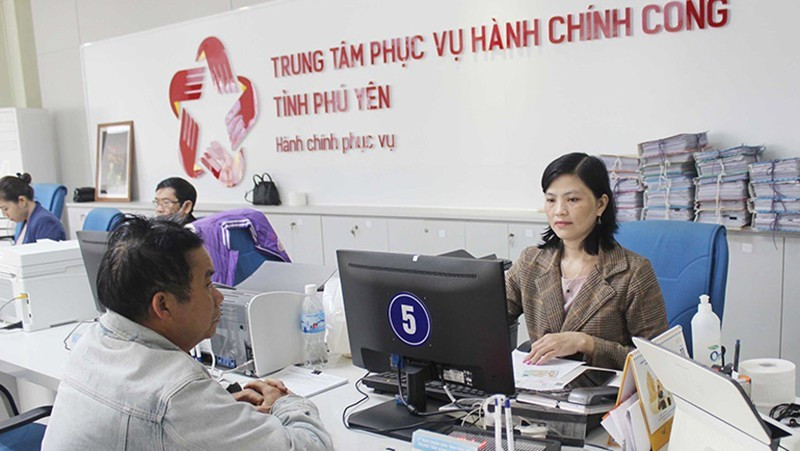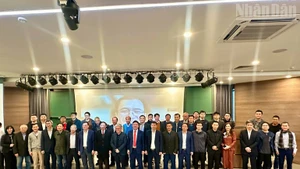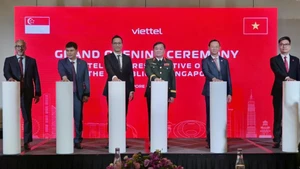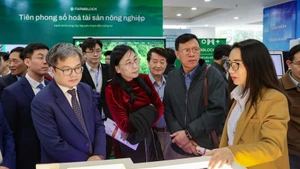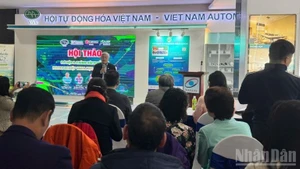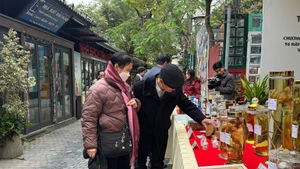Strong digitalisation in rural areas
Previously, residents of Hoa Dong Commune in Tay Hoa District had to visit the Commune’s People’s Committee office in person to handle administrative procedures. Now, thanks to the availability of free Wi-Fi across the entire area, anyone can complete these procedures at home.
For those unfamiliar with digital processes, community-based digital technology support teams are on hand to offer step-by-step guidance in a short amount of time.
With assistance from a member of the local digital support team at the village cultural house, Le Hong Thai, a resident of My Thuan Trong Hamlet, Hoa Dong Commune, was able to register his child's birth certificate on the online public service portal in just ten minutes.
“I used to shy away from technology, afraid I wouldn’t know how to use it. But once I was guided step by step, I realised how convenient and beneficial digital technology really is,” he shared.
Thai added that since digital technology has become more widespread, rural residents have gained greater control over their time, even during busy farming seasons.
With a population of over 14,350, Hoa Dong, a traditionally agricultural commune, is working towards achieving the criteria of a smart new-style rural commune by 2025. It has launched its own official website at http://hoadong.tayhoa.phuyen.vn and also established a Zalo Official Account dedicated to the commune’s People’s Committee, creating a favourable environment for interaction between authorities and citizens.
Over 90% of residents in the commune have installed and activated electronic identification accounts to access online public services.
According to Dinh Ngoc Sum, Chairman of the Hoa Dong Communal People’s Committee, Hoa Dong is one of nine communes nationwide approved by the Ministry of Agriculture and Environment to participate in the first phase of the national digital transformation programme for new-style rural development from 2021 to 2025.
Thanks to platforms such as the Zalo Official Account and the commune’s website, key policies and guidelines of the Party and the State are disseminated promptly to each citizen. Conversely, local residents can also easily connect with and express their concerns or suggestions to the local authorities.
In recent times, the "Tuy Hoa Online" mobile app has become familiar to many residents of Tuy Hoa City. With just a smartphone, Nguyen Van Tri from Ward 9 was able to report an issue concerning the deteriorating urban landscape in his neighbourhood directly to the local authorities. The process was so efficient that the issue he reported in the morning was completely resolved by noon.
The “Tuy Hoa Online” app is linked to the Smart City Intelligent Operation Center (IOC), which was launched in 2022.
Every day, the centre receives a large number of messages and reports from citizens, primarily relating to traffic, street lighting, greenery, urban infrastructure, and public order. Operating 24/7, the IOC ensures that every citizen's report is addressed promptly.
Residents can also monitor the status of their reports via the mobile app or by visiting https://tuyhoatructuyen.phuyen.gov.vn.
Nguyen Khoa Khang, Head of the Department of Economics, Infrastructure, and Urban Development of Tuy Hoa City, which manages the IOC, described it as the “brain” of the smart city.
Data collected by the IOC is aggregated and analysed to allow swift and efficient management and decision-making by city leaders. All citizen feedback is forwarded directly to the responsible unit or locality for immediate action, regardless of the time. This breakthrough solution serves as a highly effective “bridge” for interaction between the government and the people.
People and authorities are unanimous
Through the online public service portal, on average, the one-stop department of the Hoa Dong Communal People's Committee receives about 12 administrative procedure files each day. Most of the procedures are related to notarisation, justice-civil status, land-construction and culture-society. Almost all files are processed and results are returned within one day, many times faster than before.
Thanks to the online public service, Huynh Lat’s daughter in Phu Dien Trong village, Hoa Dong Commune does not have to go to Vinh Phuc Province to confirm her marital status when she completes the marriage procedures. She was guided by the one-stop department civil servant to carry out all the procedures conveniently right in the locality.
Through learning more about technology, Lat has now become an active member of the local digital technology team.
“I find online public services convenient, time- saving and cost-saving. Everything is quick and simple, not as complicated as I thought, and anyone can do it if they take the time to learn,” Huynh Lat confidently said.
In the first months of 2025, many indicators of online public service provision in Phu Yen Province remained higher than the national average. For example, the rate of electronic result issuance reached 99.25% (the national average was 73.3%); the rate of reused and digitised data utilisation reached 88.32% (the national average was 37.45%); the rate of online submissions reached 93.55% (the national average was 57.58%).
Phu Yen Province’s index for serving citizens and businesses in administrative procedures and providing public services, as reported on the National Public Service Portal, scored 84.12 points, ranking it as "good", sitting in 4th place out of 63 provinces and cities.
According to Dao Pham Hoang Quyen, Director of Phu Yen Province’s Department of Science and Technology, in the process of building the e-government, the province has put into operation the integrated and data-sharing platform (LGSP Phu Yen), which is seen as the "backbone" connecting specialised information systems.
Additionally, the infrastructure for information technology applications to serve management, specialised data connection, and sharing in the locality (Cloud Phu Yen) has been implemented uniformly from provincial to communal levels. It is encouraging that many essential public services, such as healthcare, education, and administrative procedures, have been maintained stably without any interruptions.
"The immediate task for Phu Yen in the coming period is to thoroughly grasp and successfully implement Resolution No. 57-NQ/TW of the Politburo on breakthrough development in science, technology, innovation, and national digital transformation; widely launching and quickly spreading the "Digital literacy movement." The Department of Science and Technology has also proposed solutions for implementing contents related to digital transformation when arranging administrative units and implementing the two-tier local government structure model," Quyen added.
